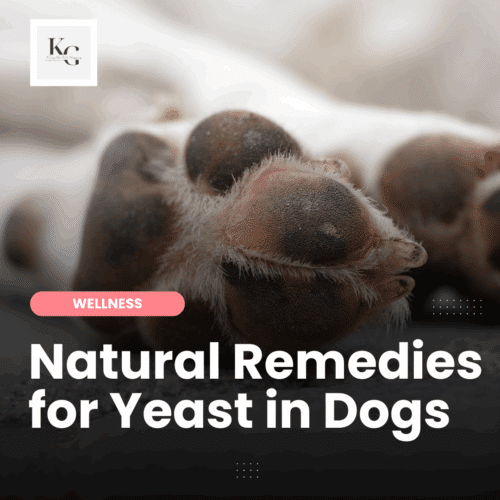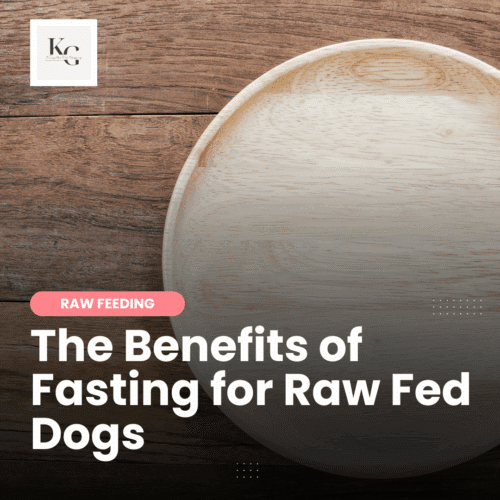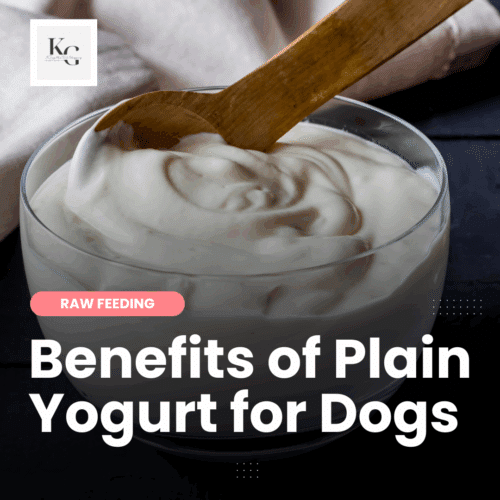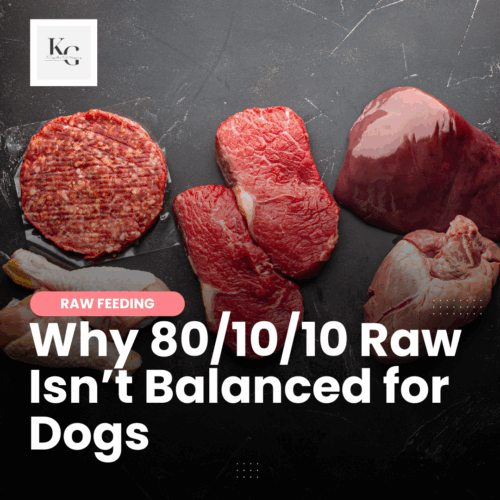Keep the Tail Wagging is supported by pet parents. I occasionally earn a commission (at no additional cost to you) when you click through an affiliate link to one of my favorite products. Thank you for your support. Read More
My love of chia seeds started with the Chia Pet. But I didn't know that the sprouts were edible, let alone good for dogs. Today, chia seeds are a regular part of my dog's diet, fed primarily as a healthy, natural source of fiber to support their gut health. In this article, I'll explore the benefits of chia seeds for dogs.
What are Chia Seeds?
Chia seeds are teeny, round seeds that plump up (best way to describe it) when they get wet. They originated in Central America (Mexico and Guatemala) and are now grown in both North and South America. I often see chia seeds used in healthy recipes as a popular “superfood,” due to the following nutrients; 100 grams is equal to 3.5 ounces or 3/4 cup:
- Omega 3 Fatty Acids – 3x the amount we find in salmon
- Manganese – 2.72 mg per 100 grams of chia seeds
- Calcium – 631 grams per 100 grams of chia seeds
- Antioxidants
- Fiber – 34 grams per 100 grams of chia seeds
- Protein – 16.5 grams per 100 grams of chia seeds
- Iron – 7.7 mg per 100 grams of chia seeds
- Magnesium – 335 mg per 100 grams of chia seeds
- Phosphorus – 860 mg per 100 grams of chia seeds
- Potassium – 407 mg per 100 grams of chia seeds
- Copper – 0.9 mg per 100 grams of chia seeds
- Zinc – 4.6 mg per 100 grams of chia seeds
And, along with the above nutrients, chia seeds offer vitamins A, B, E, and D, as well as niacin, and iodine. As impressive as this list is, chia seeds can not be used to meet a dog's nutritional needs alone. But if the diet you've formulated in the following nutrients, chia seeds may be an option: manganese, iron, magnesium, phosphorus, potassium, copper, and zinc.
Due to the fiber content, it's recommended that chia seeds be split between the day's meals to avoid stomach upset.
Benefits of Chia Seeds for Dogs
My research found that the benefits of chia seeds for dogs are the same as for humans.
Omega 3 Fatty Acids
- Skin and coat health
- Joint health; reduces inflammation
- Eye development and health
- Brain development and health
- Puppy growth
- Immune system functioning
- Supports heart health, lowers blood pressure, and cholesterol
It's important to know that dogs and humans can't easily convert ALA (alpha-linolenic acid) fatty acids to EPA & DHA, making fish, salmon, and squid oil superior options. Only 1–10% of ALA is converted into EPA and 0.5–5% into DHA in humans. Despite this news, chia seeds are still very healthy.
Manganese
- Supports bone health
- Excellent source of antioxidants to help fight cancer
- Reduces inflammation, which helps with joint and arthritis pain
- It helps to regulate blood sugar by slowing the conversion of carbs to sugars
- Supports a healthy metabolism
- Improves brain functions
- Supports a healthy thyroid
Calcium
- It supports stronger bones; combined with manganese (above), these nutrients support bone strength and density
- Promotes dental health.
Antioxidants
- Fights against the growth of cancer
Fiber
- Supports healthy digestive and healthier poops
- Supports a healthy weight
- It helps the body better absorb nutrients
- Provides nourishment for the healthy bacteria in the gut
- Absorbs water and expands, which makes dogs feel fuller longer (another vote for a fresh, raw diet since it has more moisture than dry dog food)
Chia seeds are also a great post-workout (long walk) food because they help to repair muscles, leading to muscle growth, increased strength and stamina, and more energy for future workouts.
Chia Seeds vs. Flaxseeds vs. Hemp Seeds
Several seeds are recommended for dogs, but it's not always clear how they differ. Chia seeds, flaxseeds, and hemp seeds are all nutrient-dense seeds that offer various health benefits but differ in certain aspects. Here is a comparison of these three seeds:
Similarities:
- Nutritional Profile: Chia seeds, flaxseeds, and hemp seeds are all rich in protein, dietary fiber, and ALA (alpha-linolenic acid) omega-3 fatty acids.
- Plant-Based Sources: All three seeds are derived from plants.
- Antioxidant Content: They contain antioxidants, which help protect the body's cells from damage caused by free radicals.
Differences:
- Omega-3 Fatty Acid Content: While all three seeds contain omega-3 fatty acids, flaxseeds are exceptionally high in alpha-linolenic acid (ALA). Chia seeds also contain ALA, but in slightly lower amounts, while hemp seeds have a more balanced ratio of omega-3 and omega-6 fatty acids.
- Fiber Content: Chia seeds are exceptionally high in soluble and insoluble fiber, which helps support digestive health. Flaxseeds also contain a good amount of fiber, while hemp seeds have a lower fiber content.
- Protein Content: Hemp seeds are notable for their protein content, containing all essential amino acids, making them a complete protein source. Flaxseeds and chia seeds also provide protein but in relatively lower amounts.
- Taste and Texture: Chia seeds have a gel-like texture when soaked in liquid, while hemp seeds have a soft and slightly nutty texture. Flaxseeds have a crunchy texture and a slightly nutty flavor.
In summary, all three seeds offer nutritional value, but the differences lie in their omega-3 content, fiber content, protein profile, taste, texture, and culinary uses. Including various seeds in your diet can provide a broader range of nutrients and health benefits.
Where I Buy Chia Seeds
I buy organic chia seeds from Costco, a membership club warehouse, and from a local natural grocery store by the pound.
How I Feed Chia Seeds to My Dogs
If you consume dry chia seeds, they may get stuck in your throat, leading to choking or irritation. To prevent this, it is recommended that you soak chia seeds before eating them. In my personal experience, soaked chia seeds are easier to consume.
- Soak chia seeds in a 1 to 10 ratio with water; soak ¼ cup of chia seeds in 2-1/2 cups of water.
- Soak for approximately 30 minutes (and up to two hours).
- When your “soak” is complete, you’ll have more of a gel mixture.
You can also grind chia seeds in a coffee grinder (or NutriBullet) to create flour.
How Much Chia Seeds I Feed My Dogs
With chia seeds, a little goes a long way. I feed 1/4 teaspoon for every 10 pounds of a dog's body weight. Or…
- 1 teaspoon for small dogs
- 2 teaspoons for large dogs
I primarily feed them to my senior dogs as an additional source of protein and healthy fatty acids.
Sources:
- Benefits of Manganese, Healthline.com
- Benefits of Chia Seeds, Healthline.com
- Benefits of Chia Seeds, Dr. Axe
- Chia Seeds for Pets, Dogs Naturally Magazine
- My recipe for fermented vegetables.
- My recipe for fermented seeds.
Read More About Raw Feeding & Supplements
- Understanding Embark Vet Dog DNA & Health Tests
- The Benefits of Fasting for Raw Fed Dogs
- The Benefits of Plain Yogurt for Dogs (with Recipes)
- Why the 80/10/10 Raw Food Diet Isn't Balanced for Dogs
- Can Raw Fed Dogs Eat Oysters? [Recipe Included]
This is a sponsored post. Keep the Tail Wagging® is working with Dr. Harvey's to promote their new base mix, Raw Vibrance (which I love), and other products. I have received compensation in exchange for freelance articles and product reviews; however, despite receiving compensation, all thoughts are honest and my own.







And that’s correct. Chia seeds are a source of Omega 3 fatty acids, however, our pets need and do better with animal-based Omega 3 fatty acids. In this blog post, I say “It’s important to know that dogs and humans can’t easily convert ALA fatty acids to EPA & DHA, which is what we need. But chia seeds are still very healthy.” I add chia seeds to my dogs’ diet because they’re a great source of fiber, which supports gut health, and cancer-fighting antioxidants. And there are other nutrients they add to the diet.
I am confused. Just read post by Dr. Karen Becker, which she states, “Chia and flaxseed are good sources of plant-based omega-3s, this only applies to humans, as pets lack the enzymes necessary to convert vegetable sources of omega-3s into DHA (docosahexaenoic acid). Seed oils also lack the necessary amounts of EPA pets require.
For this reason, they need animal-based sources, such as sardines (packed in water), wild-caught salmon or a krill oil supplement.”
Arugh!
¼ c chia seed
1.5 c water should be extremely thick within 3-5 min.
If it’s not getting thick potentially is not chia seeds.
Correct recipe 1 tbs chia seed to 1c water.
You are right. Thank you so much!
🙂 I think you have accidentally put grams instead of mg about manganese content in chia seeds!
This is after they’ve been soaked in water.
The amount to give, is that dry or already swollen?
I soak the seeds first.
Do you grind or soak the seeds first then measure the amount to give?
That’s very strange, Margie. I suggest adding more chia seeds next time.
So I did the “soak” of 2-1/2 cup water to 1/4 cup chia seeds and its still soup!! No gel at all! Should I add more chia seeds. Are the proportions correct? Thanks!
According to what I read, it’s 1 teaspoon for small dogs. I’m not sure about feeding every day; I prefer not to give my dogs anything every day. I would look at the different things chia seeds are bringing to their diet and then make sure I’m not doubling up elsewhere. Since chia seeds are high in Omega 3 fatty acids, I wouldn’t add it to the same meal as fish oil.
Great post about the benefits of Chia seeds for dogs. Do you think is it ok to feed it to my small dog every day? 1 teaspoon per day? Thank you.
Thanks, Wendy! I completely missed that step:
1 teaspoon for small dogs
2 teaspoons for large
1/4 teaspoon for every 10 pounds of your dog’s body weight
How much to feed to your dog?
Thank you so much! I have chia seeds everyday! Never thought about giving it to my dogs. I have never sprouted sunflower or pumpkin seeds. You you tell me how to get started. Great article and full of health benefits. Schooner and Skipper said thank you too!❤️
Do you have any thoughts on the amount to feed per lb?